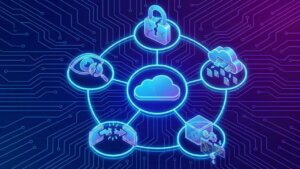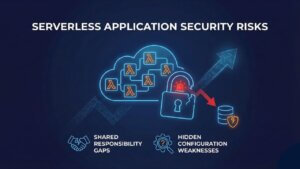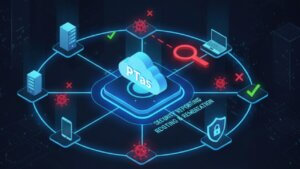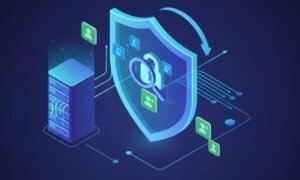The rapid adoption of cloud computing has transformed how businesses operate, offering scalability, flexibility, and cost efficiency. However, this shift to cloud-based infrastructure comes with its own set of challenges, particularly around security. Cloud security encompasses technologies, policies, controls, and services that protect cloud data, applications, and infrastructure from threats. This blog delves into the essentials of cloud security, with a particular focus on AWS Cloud Security and GCP Cloud Security, along with strategies for ensuring data security in the cloud.
Table of Contents

Cloud security is a shared responsibility between cloud service providers (CSPs) and their clients. While CSPs manage the security of the cloud infrastructure, customers are responsible for securing their data, applications, and user access. The security measures include:
Data Encryption: Ensuring data is encrypted in transit and at rest.
Identity and Access Management (IAM): Controlling access to resources.
Threat Detection and Monitoring: Using tools to detect and respond to threats.
Compliance: Adhering to industry standards and regulations.
Cloud Security Platforms: AWS & GCP Cloud Security
AWS Cloud Security
Amazon Web Services (AWS) is one of the leading cloud platforms, offering a comprehensive suite of security features to protect workloads. AWS follows a Shared Responsibility Model, where:
AWS secures the cloud infrastructure, including hardware, software, networking, and physical facilities.
Customers are responsible for securing their data, configurations, and applications.
Key Features of AWS Cloud Security
Identity and Access Management (IAM): AWS IAM allows users to control access to AWS resources by defining permissions and roles. Multi-factor authentication (MFA) adds an additional layer of security.
Encryption: AWS provides encryption for data at rest using AWS Key Management Service (KMS) and in transit with SSL/TLS protocols.
Threat Detection: AWS offers services like Amazon GuardDuty, a threat detection service that continuously monitors for malicious activity and unauthorized behavior.
Compliance and Certifications: AWS complies with major industry standards such as GDPR, HIPAA, and ISO 27001, ensuring businesses meet regulatory requirements.
Network Security: Tools like AWS Web Application Firewall (WAF) and AWS Shield protect against DDoS attacks and other vulnerabilities.
Best Practices for AWS Cloud Security
Regularly audit permissions and roles.
Enable logging with Amazon CloudWatch and AWS CloudTrail.
Use AWS Security Hub to centralize security management.
Implement security groups and network access control lists (ACLs) for better network segmentation.
GCP Cloud Security
Google Cloud Platform (GCP) is another major player in the cloud market, known for its robust security features. Like AWS, GCP adheres to the Shared Responsibility Model, ensuring that both Google and its customers play active roles in maintaining security.
Key Features of GCP Cloud Security
Identity and Access Management (IAM): GCP provides fine-grained IAM policies to control access to resources.
Encryption: GCP encrypts data by default at rest and in transit. Customers can also use Customer Managed Encryption Keys (CMEK) for additional control.
Threat Detection: Google offers Security Command Center (SCC) to monitor, detect, and respond to security threats across GCP environments.
Compliance and Certifications: GCP meets compliance standards such as PCI DSS, ISO 27001, and SOC 2/3, ensuring a secure cloud environment.
Network Security: GCP’s Virtual Private Cloud (VPC) allows for secure and customizable network configurations. Tools like Cloud Armor protect applications from DDoS attacks.
Best Practices for GCP Cloud Security
Regularly review and refine IAM roles and permissions.
Leverage the Security Command Center for proactive threat management.
Enable logging with Stackdriver for auditing and monitoring.
Use firewall rules and private IP configurations for enhanced network security.
Why Businesses Trust SecureMyOrg for Comprehensive Network Security
At SecureMyOrg, we uncover and fix all possible security vulnerabilities of mobile and web, while providing solutions to mitigate risks. We are trusted by renowned companies like Yahoo, Gojek and Rippling, and with 100% client satisfaction, you’re in safe hands!







Some of the things people reach out to us for –
- Building their cybersecurity program from scratch – setting up cloud security using cost-effective tools, SIEM for alert monitoring, building policies for the company
- Vulnerability Assessment and Penetration Testing ( VAPT ) – We have certified professionals, with certifications like OSCP, CREST – CPSA & CRT, CKA and CKS
- DevSecOps consulting
- Red Teaming activity
- Regular security audits, before product release
- Full time security engineers.
Conclusion
Both AWS and GCP offer powerful tools and services to enhance cloud security, each with unique strengths tailored to different business needs. AWS provides a robust ecosystem with features like GuardDuty and Security Hub for centralized threat management, while GCP excels in areas like encryption and proactive threat detection through its Security Command Center.
By understanding and implementing best practices on both platforms, organizations can establish a strong security posture. Businesses should regularly audit configurations, use advanced encryption techniques, and stay vigilant against emerging threats. Prioritizing security on AWS and GCP is not just about compliance but also about ensuring resilience and trust in today’s digital landscape.
Recent Posts

Top Cybersecurity Threats Facing Businesses In 2026
Businesses entering 2026 face a security landscape that is more complex, more interconnected, and far less forgiving than in previous years. Cybersecurity threats no longer

Top 5 Security Weaknesses Cloud-Native Apps Commonly Ignore
Cloud-native applications promise speed, flexibility, and scalability. Teams ship features faster, infrastructure adapts automatically, and operational overhead drops. Yet many organizations discover later that security

Why Weak Serverless Application Security Puts Your Business at Risk
Weak security in serverless environments often goes unnoticed until it leads to real damage. Misconfigured triggers, broad permissions, and poor visibility can expose sensitive data and disrupt business operations. Understanding where the risks appear is the first step toward building safer, more reliable serverless applications.

What Is Penetration Testing as a Service?
Penetration testing as a service (PTaaS) lets experts simulate real attacks to uncover vulnerabilities before hackers do. This guide explains the process, benefits, and costs, helping businesses strengthen defenses with predictable, ongoing security checks.

How To Inspect Encrypted Traffic Without Breaking Privacy
Network administrators face a challenge: securing systems while respecting privacy. This guide explains how to inspect encrypted traffic without breaking privacy using metadata, anomaly detection, and machine learning ensuring visibility, compliance, and trust.

How to Audit Infrastructure as Code (IaC) for Security Vulnerabilities
Discover how to audit Infrastructure as Code (IaC) for security vulnerabilities with this practical guide. Learn to scan IaC files using tools like Checkov, fix issues like exposed resources, and integrate audits into CI/CD pipelines. Protect your cloud systems from misconfigurations and ensure compliance with clear, actionable steps.
